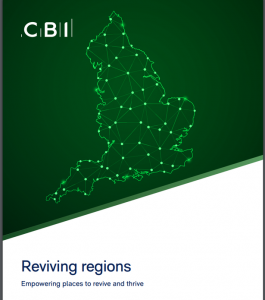Boosting skills and developing the physical and digital infrastructure will be vital for South West to build back better from the economic ravages of coronavirus, the CBI said today in a major new report.
Called Reviving Regions, the paper highlights long-standing regional inequalities across England which have inhibited growth, opportunity and productivity for generations. 
These economic disparities, both across England and within regions themselves, are at risk of widening further if the government’s ‘levelling-up’ ambitions falter in the wake of Covid-19, the report says.
In the South West, it is improvements to infrastructure – ranging from enhanced digital connectivity to rail and road projects such as long-awaited upgrades to the M4, M5 and A303 – that have the potential to be transformational, according to the CBI.
Increased spending on training – along with retraining – is another priority for the region, with the coronavirus pandemic having undermined the South West’s traditionally-strong levels of employment with large numbers of workers remaining furloughed, particularly in its vital tourism sector.
Equipping them with new skills could protect individual livelihoods and support communities as well as tackling the region’s historically levels of productivity outside its main towns and cities such as Swindon, Bath and Bristol.
Underpinning all this, says the CBI, is a need to empower local and regional leaders, so allowing them to create a culture where businesses can operate, invest and grow with confidence.
The report, sponsored by Lloyds Banking Group, calls for an overall long-term strategic vision to guide the country through a vital post-Covid recovery and towards long-term prosperity.
Its recommendations include:
- Setting up Catapult Quarters across the country as a way to level-up R&D spending, ensuring bids align with local recovery plans and deliver against long-term ambitions.
-
Transforming Job Centres into regionally led ‘jobs and skills hubs’, with strong local and regional autonomy to respond to changing job markets and align with local and regional skills and education initiatives.

- Giving local enterprise partnerships (LEPs) and growth hubs the resource and capacity to deliver locally specific skills support. This should address the barriers SMEs face in investing in skills and should support the UK’s global ambitions for net zero and digital industries.
- Establishing a roadmap for the future of adult skills which includes the devolution of adult skills funding to areas with devolution deals, in order to drive innovative approaches to reskilling and upskilling across regions.
- Giving local and regional leaders the powers, funding and necessary skillsets to design and deliver local and regional plans for active, integrated, flexible and sustainable travel that meets the needs of local businesses and communities.
- Helping local authorities do more to support broadband and 5G roll-out by working closely with network providers, embedding it within their economic development plans and appointing digital champions to local authority cabinets, thereby ensuring all regions are attractive places to invest.
- Providing mayoral combined authorities and subnational transport bodies with long-term devolved funding settlements to deliver a clear regional vision for connectivity, housing, and economic growth. This must be complemented with multi-year budgeting for local authorities to allow for integrated long-term planning and investments.
- Delivering high-quality, strategic business advice, particularly to support SMEs, and exposing businesses to exporting opportunities. This would be achieved by the government working in lockstep with LEPs and growth hubs, combined authorities and pan-regional bodies and follows last month’s announcement of a pilot Export Academy in the South West to support small exporters.
- Urgently outlining plans for the future of the UK Shared Prosperity Fund. This must include parity with existing EU funding allowing local investment to align with local growth strategies and regional recovery plans.
- Working with local and regional stakeholders, to close the gap across regions between supply and demand for equity finance, supporting businesses to invest to grow, and create a thriving, post-pandemic economy.
CBI South West chair Susan Davy, pictured, said: “The South West is a region with many examples of excellence, ranging from thriving cities like Bristol and Exeter to outstanding strength in sectors such as advanced engineering, digital innovation and green industries. 
“Yet these successes are not spread evenly, even within the region. Skills gaps and pockets of low productivity restrict opportunity and prosperity in parts of the South West, and challenges around connectivity – both physical and digital – have seen slow progress.
“Action on these issues is vital if the region is to enjoy a fair and sustainable recovery. We must attract the investment needed to enable South West businesses to enjoy success not just regionally or nationally, but globally too.”
The CBI believes the actions outlined in Reviving Regions can mitigate the regional impact of the pandemic and ensure no towns or cities are left behind as the nation looks to rebuild.
However, it stresses that a ‘one size fits all’ approach cannot succeed in combating issues which are unevenly spread, and advocates actions being locally and regionally led to ensure they are appropriately targeted.
Lloyds Banking Group South West ambassador Jeremy Hayward said: “The regions and nations of the UK have a huge role to play in the country’s recovery from the effects of the pandemic and we need to approach it in a joined up way that supports a sustainable future.
“The South West is known for its green credentials and using this to create jobs, increasing the skills base of the workforce and improving both physical and digital infrastructure in a way that supports a green recovery – will go a long way to help the region fulfil its potential.”
Among the case studies in the report highlighting regional collaboration and growth initiatives is the Western Gateway, the body that brings together local authorities spanning the Severn, including Swindon, Bath, Bristol, Newport and Cardiff, which is aiming to replicate the success of the Northern Powerhouse and Midlands Engine in attracting more powers and funding from Westminster.














